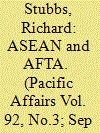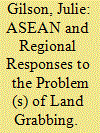| Srl | Item |
| 1 |
ID:
167468


|
|
|
| 2 |
ID:
157931


|
|
|
|
|
| Summary/Abstract |
Popularly represented as the phenomenon of “land grab,” changes in the acquisition, exploitation and significance of land across the world encapsulate myriad needs, motivations, and strategic ambitions. What is becoming clear is that these diverse burgeoning twenty-first-century phenomena in the name of land increasingly define and structure many of the decisions made by states and international institutions today. Despite being one of the most pressing regional and international problems of the current era, however, the issue of land grab is not on the agenda of the Association of Southeast Asian Nations. Member states of this association have acknowledged the transboundary effects of many contemporary phenomena and work together to alleviate security concerns and enhance collective economic opportunities, and yet they face both institutional and cognitive barriers to any attempts to address collectively the problems related to land grabbing. This article aims to examine the contemporary political space navigated and contested within ASEAN and to define the problems inherent in finding a collective action solution to this complex dynamic set of issues.
|
|
|
|
|
|
|
|
|
|
|
|
|
|
|
|
| 3 |
ID:
187401


|
|
|
|
|
| Summary/Abstract |
This paper argues that amid intensifying Sino-U.S. rivalry, middle powers in East Asia have contributed towards regional peaceful change through the exercise of good regional citizenship, a concept which draws on and modifies from the more commonly known good international citizenship which is closely associated with middle powers. Specifically, good regional citizenship involves proactively strengthening inclusive multilateralism, enhancing the rules-based order, and contributing to bridging efforts in East Asia. The paper examines the good regional citizenship of two middle powers, namely Australia and Indonesia. It finds that while both countries have exercised good regional citizenship, their specific strategies or the outcomes of their initiatives on regional dynamics have varied as a result of their relations with the respective major powers and their general foreign policy approaches. Australia’s good regional citizenship has supported the preservation of U.S. leadership in East Asia vis-à-vis the rise of other regional powers, while Indonesia’s good regional citizenship has helped to narrow the gaps among regional actors through mechanisms led by the Association of Southeast Asian Nations (ASEAN).
|
|
|
|
|
|
|
|
|
|
|
|
|
|
|
|